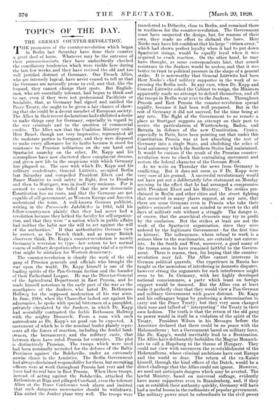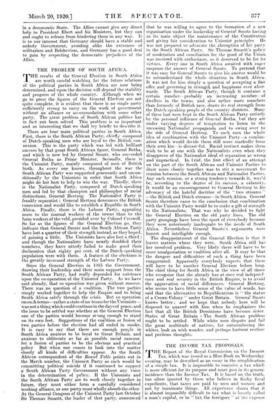TOPICS OF THE DAY.
THE GERMAN COUNTER-REVOLUTION.
THE promoters of the counter-revolution which began in Berlin last Saturday have done their country a great deal of harm. Whatever may be the outcome of their pronuncialniento, they have undoubtedly checked the conciliatory tendencies which were visible here during the last few weeks, and they have revived the old and too well justified distrust of Germany. Our French Allies, who are intensely logical, have never ceased to tell us that the Germans are naturally prone to evil, and that, like the leopard, they cannot change their spots. But English- men, who are essentially tolerant, had begun to think and to say, even if they were not professional Pacificists or Socialists, that, as Germany had signed and ratified the Peace Treaty, she ought to be given a fair chance of show- ing that she could be a decent member of European society. The Allies in their recent declarations had exhibited a desire to make things easy for Germany, especially in regard to the war criminals and to the question of commercial credits. The Allies saw that the Coalition Ministry under Herr Baue1, though not very impressive, represented all the moderate parties in Germany, and they were disposed to make every allowance for its faults because it stood for resistance to Prussian militarism on the one hand and Spartacist anarchy on the other. Dr. Kapp and his accomplices have now shattered these complacent dreams, and given new life to the suspicions with which Germany has plagued us. The ease with which Dr. Kapp and his military confederate, General Liittwitz, occupied Berlin last Saturday and compelled President Ebert and the Bauer Ministry to seek safety in flight, first to Dresden and then to Stuttgart, was in itself very ominous. For it seemed to confirm the belief that the new democratic Constitution has no roots, and that the Germans are not capable of self-government, as Western Europe and America understand the term. A well-known German publicist, writing in the Preussische Jahrbiicher in 1916, told his fellow-countrymen plainly that they had never had a revolution because they lacked the faculty for self-organiza- tion, and that they were " a nation which in public affairs had neither the habit nor the will to act against the will of the authorities." If that authoritative German view be correct, as the French think, and as many British observers think, Dr. Kapp's counter-revolution is merely Germany's reversion to type—her return to her normal course of military despotism after a passing trial of a system that might be mistaken for Western democracy.
The counter-revolution is clearly the work of the old gang of Prussian generals and officials who brought the war upon the world. Dr. Kapp himself is one of the leading spirits of the Pan-German faction. and the founder of their Fatherland League. He was the Director-General of the Agricultural Department in East Prussia, and he made himself notorious in the early part of the war as the mouthpiece of the Junkers, who hated Dr. Bethmann Hollweg for the supposed moderation of his war aims. In June, 1916, when the Chancellor lashed out against his adversaries, he spoke with special.bitterness of a pamphlet, privately circulated by the Junkers, in which Dr. Kapp had scornfully contrasted the feeble Bethmann Hollweg with the mighty Bismarck. From a man with such antecedents as Dr. Kapp's no good can be expected. A movement of which he is the nominal leader plainly repre- sents all the forces of reaction, including the feudal land- owners, the bureaucracy, and the military caste, that between them have ruled Prussia for centuries. The plot is distinctively Prussian. The troops which were used had been nominally recruited for the defence of the Baltic Provinces against the Bolsheviks, under an extremely unwise clause in the Armistice. The Berlin Government had always disclaimed responsibility for them, but recruiting officers were at work throughout Prussia last year and the force had its real base in East Prussia. When these troops, instead of acting against the Bolsheviks, attacked the Esthonians at Riga and pillaged Courland, even the tolerant Allies at the Peace Conference took alarm and insisted that such dangerous mercenaries should be withdrawn. This suited the Junker plans vory well. The troops were transferred to Doberitz, close to Berlin, and remained there in readiness for the counter-revolution. The Government must have suspected the design, but, for reasons of their own, they made no effort to disband the force. Herr Noske may have felt confident that his large " citizen army," which had shown perfect loyalty when it had to put down Spartacist risings, would be equally loyal when it was required to crush reaction. On the other hand, he may have thought, as some correspondents hint, that armed resistance to the Junkers would be useless, and that it was better to trust to political pressure in the shape of a general strike. It is noteworthy that General Liittwitz had been Herr Noske's chief military supporter in the work of re- pressing the Berlin mob. In any case, when Dr. Kapp and General Liittwitz asked the Cabinet to resign, the Ministers apparently made no attempt to defend themselves, and all the troops in Berlin went over to the Junkers. Throughout Prussia and East Prussia the counter-revolution spread rapidly, because it had been well prepared. But in the rest of Germany it did not succeed, for the time being at any rate. The flight of the Government to so remote a place as Stuttgart suggests an attempt on their part to revive the particularism of Wurttemberg, Baden, and Bavaria in defence of the new Constitution. Cynics, especially in Paris, have been pointing out that under this Constitution Prussia was at last absorbing the rest of Germany into a single State, and abolishing the relics of local autonomy which the Southern States had maintained. It would be curious if the result of the Prussian counter- revolution were to check this centralizing movement and restore the federal character of the German Reich.
As we write on Thursday the news from Germany is conflicting. But it does not seem as if Dr. Kapp were very sure of his ground. A successful revolutionary would not have put out a deliberately false statement on Monday morning to the effect that he had arranged a compromise with President Ebert and his Ministry. The strikes pro- claimed in Berlin and other cities and the street fighting that occurred in many places suggest, at any rate, that there are some Germans even in Prussia who take their polities seriously and are not minded to revert to the. old days of military rule without a struggle The danger is, of course, that the anarchical elements may try to profit by the confusion. But the strikes at least are not the work of the Spartacist organization, since they were ordered by the legitimate Government—for the first time in history. The railwaymen. whose refusal to work is a serious blow to the reactionaries, are certainly not extrem- ists. In the South and West, moreover, a good many of the troops seem to have remained faithful to the Govern- ment. There is reason, then, for hoping that the counter- revolution may fail. The Allies cannot intervene in German political quarrels. Our experience in Russia has taught us the unwisdom of interfering in domestic disputes, however strong the arguments for such interference might seem to be. In Germany, with her highly developed national consciousness, a party which leant on foreign support would be doomed. But the Allies can at least make it perfectly clear that they would view a Pan-German and military Government with grave distrust. Dr. Kapp and his colleagues began by professing a determination to carry out the Peace Treaty; but they very soon changed their tone and talked of " interpreting " the Treaty in their own fashion. The truth is that the return of the old gang to power would in itself be a violation of the spirit of the Treaty. President Wilson in his Messages before the Armistice declared that there could be no peace with the Hohenzollern ; but a Government based on military force, like Dr. Kapp's, would inevitably lead to a Restoration. The Allies have deliberately forbidden the Magyar Monarch- ists to call a Hapsburg to the throne of Hungary. They could not view with unconcern the re-establishment of the Hohenzollerns. whose criminal ambitions have cost Europe and the world so dear. The return of the ex-Kaiser himself, through the kind offices of the Dutch, would be a direct challenge that the Allies could not ignore. However, we need not anticipate dangers which may be averted. The lawful Ministry, based on universal suffrage, evidently have many supporters even in Brandenburg, and; if they can re-establish their authority quickly, Germany will have had a useful lesson in the rudiments of popular government. The military power must be subordinate to the civil power in a democratic State. The Allies cannot give any direct help to President Ebert and his Ministers, but they can and ought to refrain from hindering them in any way. It is to our interest that Germany should have a stable and orderly Government, avoiding alike the extremes of militarism and Bolshevism, and Germany has a good deal to gain by respecting the democratic prejudices of the Allies.





































 Previous page
Previous page